As of 01/02/2026
Indus: 48,382 +319.10 +0.7%
Trans: 17,535 +178.23 +1.0%
Utils: 1,078 +9.71 +0.9%
Nasdaq: 23,236 -6.36 0.0%
S&P 500: 6,858 +12.97 +0.2%
|
YTD
+0.7%
+1.0%
+0.9%
0.0%
+0.2%
|
 46,800 46,800 or 49,500 by 01/15/2026
 16,800 16,800 or 18,400 by 01/15/2026
 1,040 1,040 or 1,100 by 01/15/2026
 22,400 22,400 or 24,500 by 01/15/2026
 6,700 6,700 or 7,250 by 01/15/2026
|
|
As of 01/02/2026
Indus: 48,382 +319.10 +0.7%
Trans: 17,535 +178.23 +1.0%
Utils: 1,078 +9.71 +0.9%
Nasdaq: 23,236 -6.36 0.0%
S&P 500: 6,858 +12.97 +0.2%
|
YTD
+0.7%
+1.0%
+0.9%
0.0%
+0.2%
|
 46,800 46,800 or 49,500 by 01/15/2026
 16,800 16,800 or 18,400 by 01/15/2026
 1,040 1,040 or 1,100 by 01/15/2026
 22,400 22,400 or 24,500 by 01/15/2026
 6,700 6,700 or 7,250 by 01/15/2026
|
|
Bulkowski's 2024 Forecast Update
Below is the updated forecast for 2024 as of the close on November 29, 2024. Captions appear below the pictures for guidance, so be sure to scroll down far enough to read them.
On some of the charts (all except the CPI chart) the prediction in red is based on the work of Edgar Lawrence Smith in the 1930s. Smith said that the stock market followed a 10-year cycle.
Each year tended to repeat the behavior of the year a decade earlier. In other words, if you averaged all years ending in 1 (2001, 1991, 1981 and so on), that would give you a forecast for
2011. For 2012, you'd make a similar average, only use 2002, 1992, 1982, and so on. That's what I did for the market forecast charts which follow.
1 / 5
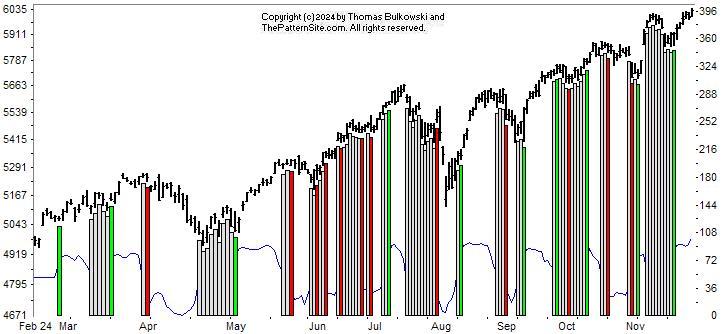
This is a chart of the Chart Pattern Indicator (CPI) on the daily scale.
The most recent signal is green, meaning bullish. You can see the thin blue indicator line near the bottom of the chart has ticked upward. I forgot to take note of the value of the CPI but it looks
to be at or near 100. That's the top of the scale. Of course, if it's at 100 then it can only drop, but so far, there's no indication of that happening.
The next chart looks at the Dow industrials.
2 / 5
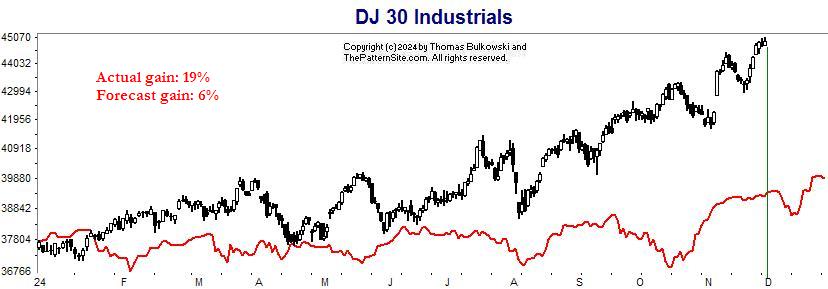
This is the Dow industrials on the daily scale. The forecast is in red.
As the chart says, the forecast this year was for a gain of 6% and the index soared 19%, so far. The forecast says to expect weakness in the next two weeks but it likely won't be a drop of 13 percentage points
in the Dow.
The next chart looks at the Nasdaq forecast.
3 / 5
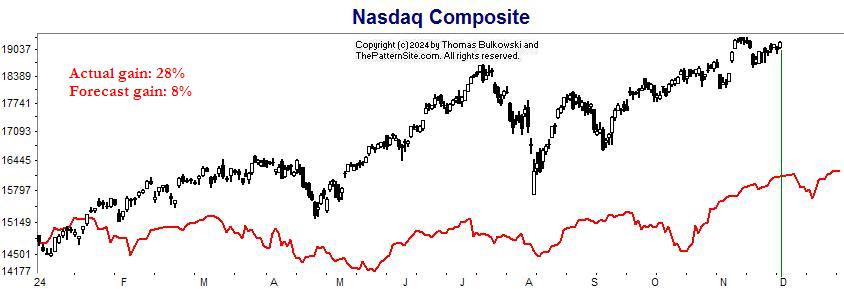
This is the Nasdaq.
The Nasdaq's gain this year (28%) has beat the other indices to be the best performing. The forecast also shows weakness for the next two weeks or so.
The S&P 500 forecast for 2024 is next.
4 / 5
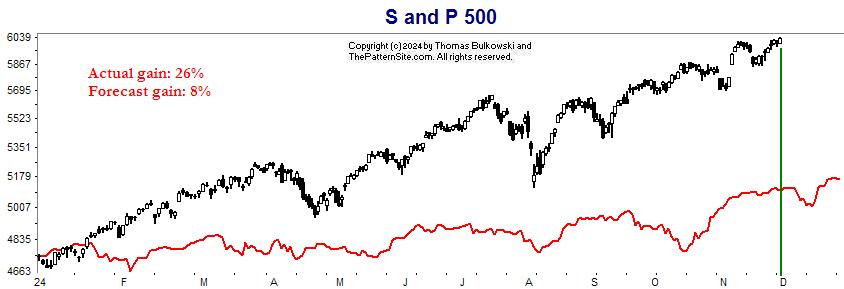
Here's the S&P 500 index on the daily scale for 2024
The gain this year, so far, is a tidy 26%. That's terrific when the markets tend to rise something like nine or ten percent annually. Again, we see a dip of market weakness predicted for the coming two weeks,
followed by strength going into year end. The year end move should push the index into higher territory.
10-year forecast next.
5 / 5
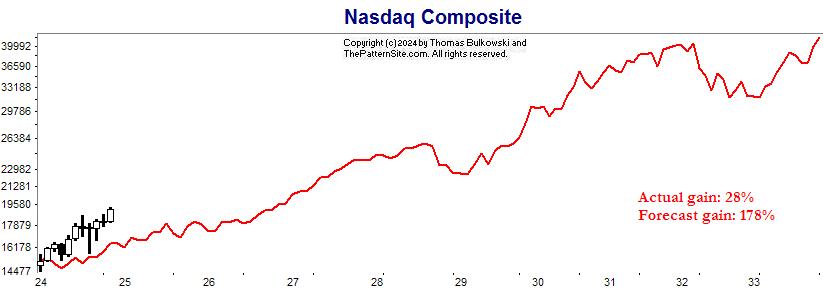
Here's the updated Nasdaq 10-year forecast.
The forecast for the next 10 years predicts a gain of 178%, which is almost a tripling of your money if your return matches the forecast. That's a good value. Years 2028 and 2032 could be difficult
but you'll be rewarded if you hold until the start of 2034 (and perhaps longer).
The end.
❮
❯
See Also
Support this site! Clicking any of the books (below) takes you to
Amazon.com If you buy ANYTHING while there, they pay for the referral.
Legal notice for paid links: "As an Amazon Associate I earn from qualifying purchases."
|
My Stock Market Books
|
My Novels
|
Copyright © 2005-2026 by Thomas N. Bulkowski. All rights reserved.
Disclaimer: You alone are responsible for your investment decisions. See
Privacy/Disclaimer for more information.
Some pattern names are registered trademarks of their respective owners.